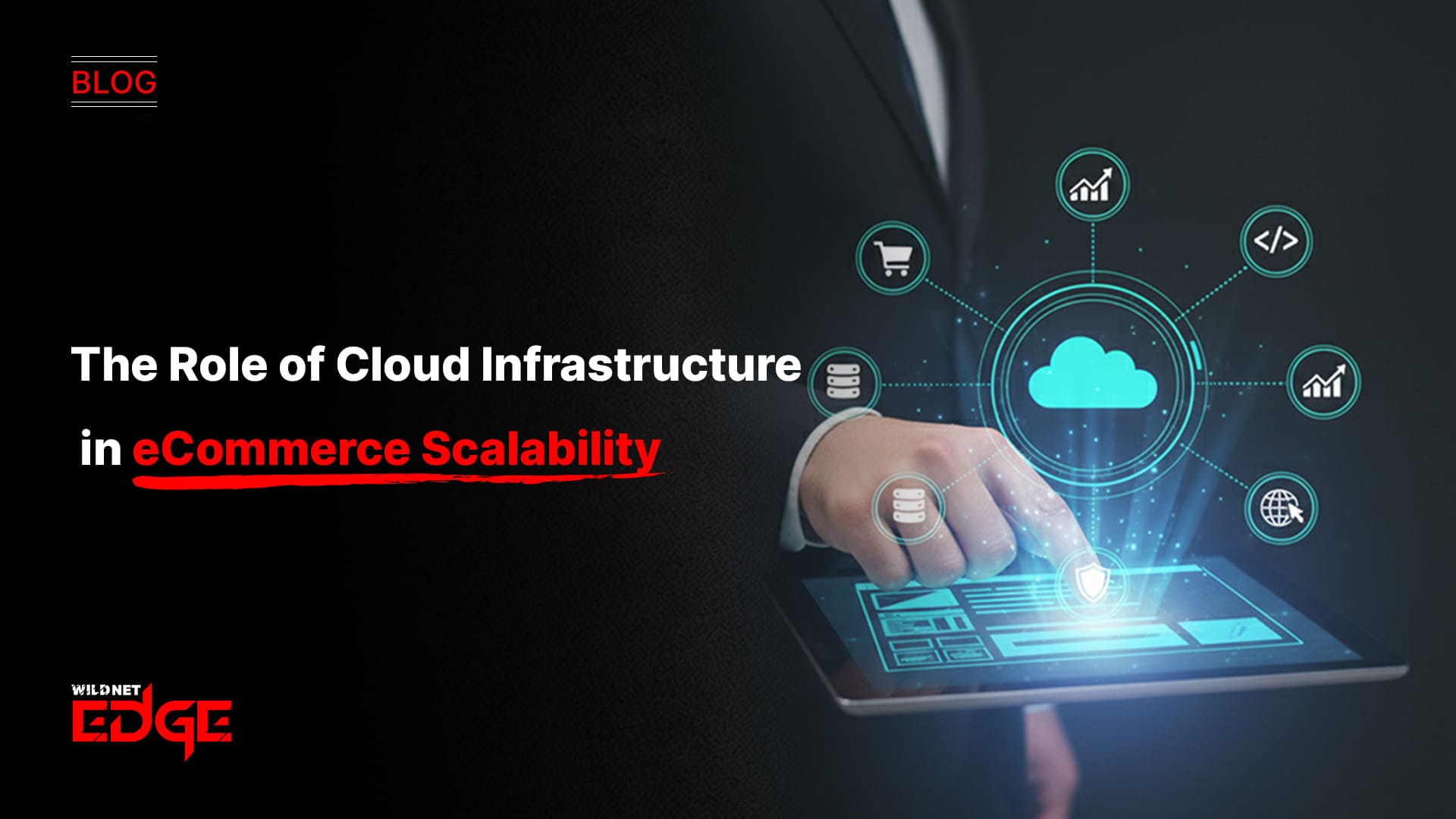TL;DR
This article highlights the importance of robust cloud infrastructure for scalable eCommerce. Cloud platforms enable stores to handle traffic spikes with auto-scaling, load balancing, and CDNs, while offering cost efficiency, enhanced security, and global reach. A well-architected cloud foundation ensures reliable performance and a superior customer experience, supporting sustainable growth for online businesses.
Your eCommerce store is booming. Traffic is increasing, sales are climbing, but suddenly, your website starts slowing down during peak hours. It crashes entirely during a major sales event like Black Friday. This nightmare scenario is often the result of an inadequate foundation. In the dynamic world of online retail, the ability to scale seamlessly is not a luxury; it’s a necessity. The key to unlocking this capability lies in leveraging the power of cloud infrastructure for ecommerce.
What is Cloud Infrastructure for eCommerce?
Cloud infrastructure for ecommerce refers to the collection of cloud-based computing resources and services specifically used to host, run, and manage an online store. This goes far beyond simply renting a server. It encompasses a suite of tools designed for flexibility and resilience, including:
- Compute Resources: Virtual servers, containers (Docker/Kubernetes), or serverless functions that run your website code.
- Databases: Scalable managed databases (SQL or NoSQL) to store product catalogs, customer information, and order data.
- Storage: Object storage for images and media, and block storage for server volumes.
- Networking: Load balancers to distribute traffic, Content Delivery Networks (CDNs) to speed up global access, and virtual private clouds (VPCs) for security.
These cloud solutions work together to create an environment that can adapt dynamically to the fluctuating demands of an online business.
Why a Scalable Cloud Foundation is Critical
For an eCommerce business, infrastructure limitations directly translate to lost revenue and damaged reputation. A scalable cloud foundation is essential for several reasons.
Handling Peak Traffic Loads
eCommerce traffic is rarely consistent. You experience massive spikes during sales events, holidays, or marketing campaigns. Traditional hosting requires you to provision for the absolute peak, meaning you overpay most of the time. Cloud infrastructure allows you to automatically scale up resources when traffic surges and scale back down when it subsides. These capabilities define truly scalable eCommerce platforms.
Ensuring High Availability and Reliability
Downtime is death for an online store. Cloud providers offer high levels of redundancy across multiple data centers. A well-architected cloud setup can automatically failover to a healthy server if one component fails, ensuring your store remains online and accessible to customers 24/7. This reliability builds customer trust.
Global Reach and Performance
If you sell internationally, you need to provide a fast experience for customers everywhere. Content Delivery Networks, a core part of cloud infrastructure, cache your website’s content in servers located around the world. This means a customer in London loads your site from a nearby server, not one located across the ocean, dramatically improving page load speed and user experience globally. Building global reach is easier with robust Cloud Infrastructure Services.
Cost Efficiency (Pay-As-You-Go)
As mentioned, the cloud’s pay-as-you-go model is ideal for the variable nature of eCommerce. You avoid massive upfront investments in hardware and only pay for the compute power, storage, and bandwidth you actually consume. This makes managing costs more predictable and aligns your infrastructure spending directly with your revenue.
Key Components for Scalable eCommerce Platforms
Building for scale involves leveraging specific cloud technologies:
- Auto-Scaling: Automatically adjusts the number of servers based on metrics like CPU utilization or incoming traffic.
- Load Balancing: Distributes incoming traffic across multiple servers to prevent overload and ensure responsiveness.
- Managed Databases: Cloud databases that handle scaling, backups, and patching automatically, freeing up your team.
- Serverless Computing: For specific functions (like image processing or API endpoints), serverless allows code to run without managing any servers, scaling infinitely on demand.
Our Cloud Solutions for eCommerce in Action: Case Studies
Case Study 1: A Retailer Surviving Black Friday
- The Challenge: A rapidly growing online retailer had experienced site crashes during previous Black Friday weekends, costing them significant revenue. Their traditional hosting couldn’t handle the extreme traffic spikes.
- Our Solution: We migrated their entire platform to AWS, implementing an auto-scaling group for their web servers and a load balancer. We also utilised Amazon RDS for their database and configured CloudFront CDN for global content delivery. This involved our expert cloud solutions team.
- The Result: The following Black Friday, their cloud infrastructure for ecommerce scaled seamlessly to handle a 10x increase in traffic compared to a typical day. They experienced zero downtime and achieved record sales, proving the power of cloud elasticity.
Case Study 2: A D2C Brand’s Global Launch
- The Challenge: A direct-to-consumer brand was launching internationally but was concerned about providing a fast and consistent user experience for European and Asian customers from its US-based servers.
- Our Solution: We designed a multi-region deployment strategy. We leveraged a global CDN to cache static assets close to users worldwide and used geo-routing to direct traffic to the nearest application server cluster. This ensured optimal performance regardless of user location. Such complex builds often require end-to-end Ecommerce Development Services.
- The Result: The brand successfully launched in multiple international markets with page load times consistently under 2 seconds for users globally. This positive user experience was a key factor in their rapid global growth.
Our Technology Stack for eCommerce Infrastructure
We use industry-leading, scalable technologies.
- Cloud Providers: Amazon Web Services (AWS), Google Cloud Platform (GCP), Microsoft Azure
- Containerization: Docker, Kubernetes (EKS, GKE, AKS)
- Infrastructure as Code (IaC): Terraform, AWS CloudFormation
- Databases: Amazon Aurora, PostgreSQL, MySQL, MongoDB Atlas
- CDN: Cloudflare, AWS CloudFront, Fastly
- Monitoring: Datadog, New Relic, Grafana
Conclusion
For any ambitious eCommerce business, a robust and scalable cloud infrastructure for ecommerce is not optional; it is the foundation for growth. It provides the agility, reliability, and performance needed to handle peak traffic, expand globally, and deliver the exceptional user experience that modern customers expect. Investing in the right cloud solutions and architecture directly affects your store’s future success.
Ready to build an eCommerce platform that can scale limitlessly? At Wildnet Edge, our AI-first approach enhances our services, allowing us to build intelligent, self-optimising infrastructure. We partner with businesses, including those needing a specialised SaaS Development Company, to create scalable eCommerce platforms that are not just powerful but also smart and cost-effective.
FAQs
It improves conversion rates primarily through speed and reliability. Faster page load times significantly reduce bounce rates, and high availability ensures customers can always complete their purchase, especially during peak sales periods.
The biggest mistake is simply doing a “lift and shift” – moving an old, non-cloud-optimized application directly onto a cloud server without redesigning it. This often results in high costs and poor performance because the application isn’t built to leverage cloud-native features like auto-scaling.
Major cloud providers offer sophisticated security tools and expertise that most individual businesses cannot match. This includes advanced DDoS protection, managed firewalls, automated security patching, and robust compliance certifications (like PCI DSS).
The choice often depends on factors like your team’s existing expertise, specific service needs (e.g., AI/ML tools), and pricing models. All three major providers offer excellent services for eCommerce. An expert consultant can help evaluate the best fit for your specific requirements.
A CDN is a network of servers distributed globally that store copies of your website’s static content (images, CSS, JavaScript). When a user visits your site, the CDN delivers this content from a server geographically close to them, dramatically reducing latency and speeding up page load times worldwide.
Yes. While platforms like Shopify Plus manage their own infrastructure, stores built on platforms like Magento or custom solutions can absolutely be migrated to optimised cloud infrastructure for e-commerce on AWS, Azure, or GCP for better performance and scalability.
Estimating costs requires analysing your current traffic patterns, data storage needs, and computing requirements. Cloud providers offer pricing calculators, but working with a cloud expert can help you design an optimised architecture and provide a more accurate forecast based on pay-as-you-go principles.

Nitin Agarwal is a veteran in custom software development. He is fascinated by how software can turn ideas into real-world solutions. With extensive experience designing scalable and efficient systems, he focuses on creating software that delivers tangible results. Nitin enjoys exploring emerging technologies, taking on challenging projects, and mentoring teams to bring ideas to life. He believes that good software is not just about code; it’s about understanding problems and creating value for users. For him, great software combines thoughtful design, clever engineering, and a clear understanding of the problems it’s meant to solve.
 sales@wildnetedge.com
sales@wildnetedge.com +1 (212) 901 8616
+1 (212) 901 8616 +1 (437) 225-7733
+1 (437) 225-7733















 ChatGPT Development & Enablement
ChatGPT Development & Enablement Hire AI & ChatGPT Experts
Hire AI & ChatGPT Experts ChatGPT Apps by Industry
ChatGPT Apps by Industry ChatGPT Blog
ChatGPT Blog ChatGPT Case study
ChatGPT Case study AI Development Services
AI Development Services Industry AI Solutions
Industry AI Solutions AI Consulting & Research
AI Consulting & Research Automation & Intelligence
Automation & Intelligence















